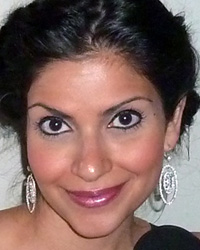 What would it be like if your clinician didn’t understand your culture or treated you as something other than “normal” because of your ethnicity, religion, or gender? Would you receive appropriate, effective treatment? Attorney, author and mental health activist Melody Moezzi talks with Care For Your Mind about how her religion influences her mental health and why the mental health care system should become more culturally competent.
What would it be like if your clinician didn’t understand your culture or treated you as something other than “normal” because of your ethnicity, religion, or gender? Would you receive appropriate, effective treatment? Attorney, author and mental health activist Melody Moezzi talks with Care For Your Mind about how her religion influences her mental health and why the mental health care system should become more culturally competent.
Does Cultural Bipolarity Create Barriers to the Delivery of Quality Mental Health Care?
CFYM: In your book, Hadol and Hyacinths: A Bipolar Life, you write about your experience living with and recovering from both clinical and cultural bipolarity. Can you expand on how you experienced cultural bipolarity?
MM: Well, I can’t say that I “recovered” from either in any literal sense. Rather, I’ve learned to see the beauty in both, which has helped me accept the fact that they’ll be with me in one way or another throughout my life. As for the cultural part, it’s a matter of birth, something I’ll never escape, and honestly wouldn’t want to—and I should say the same applies (for the most part) to the clinical side.
Being an Iranian-American Muslim living in the US today isn’t easy, but it gives me a really useful perspective that I don’t think I would have otherwise. Because I never feel quite at home anywhere—in fact, when I’m in the US I feel more Iranian, and when I’m in Iran, I feel more American—I have had to construct a life that works for me regardless of outside forces.
I am learning that home isn’t as much a place as it is a set of people—and in my case, a couple cats and some orchids thrown in as well. I’ve learned to treasure my uniqueness, as it’s helped me relate to other minorities and persecuted groups, including fellow survivors of serious mental illness and suicide. As much pain as it has caused me, it has also led me to seek out some pretty amazing people with similar experiences in terms of representing a minority, whether it’s because of their mental health status or sexual orientation or race or gender identity or whatever. I relate to the “other” because that’s who I am, and I wouldn’t change that.
CFYM: What role has Islam played in your ability to cope with mental illness?
MM: My faith has helped save me on many occasions, but as with most faiths, the Muslim community is also full of people who simply don’t understand the fact that a mental illness is just that and that it’s not some moral failing. Nevertheless, my connection with the Divine has been integral to my healing. I find refuge in prayer, and I consider my activism a type of prayer. The concept of jihad is highly misunderstood in much of the Western world. Unfortunately, the media has adopted the extremists’ interpretation, rather than that of the vast majority of Muslims. In fact, jihad simply means struggle. It signals a struggle to maintain faith in a world where it’s easy to lose it and a struggle to fight injustice in the world.
In my eyes, these are two sides of the same coin. The more you work toward worldly justice, the more peace you find spiritually, and the more peace you find spiritually, the more able you are to pursue worldly justice. Being an activist and writing about and speaking out in defense of the rights of others who experience oppression and injustice—whether they be Muslims or Jews or Hindus or Baha’is or Atheists or anyone else—is a duty that is impressed upon me as a Muslim, and I don’t take that lightly. It is what drives me to speak out for those suffering from mental illness and others who experience discrimination of any sort.
CFYM: Do you think the medical community could have done a better job helping you circumvent cultural barriers that delayed the onset of a path to recovery and wellness?
MM: Yes! The idea of cultural proficiency just doesn’t seem to be important to many health care providers, yet it presents a serious barrier to wellness for many of us who come from different cultures. I think the medical community—and particularly the mental health community—needs to start taking such things seriously. Of course, they can’t be familiar with every culture, but it’s important that they take culture seriously, that they not be afraid to ask questions, that they try to understand at least.
Your Turn
- Ms. Moezzi shares that being “other” is who she is. Have you experienced being “other”? Do you think it affected the mental health care you received?
- How would you recommend the medical community move from doctor-centric to people-centric or, even “other-centric” treatment models?









Connect With Us